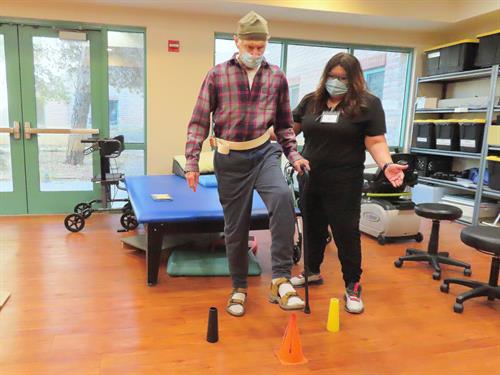Posted By
Nanci Levy
| Apr 06, 2022
 The term “therapy” is used to describe treatment used to help resolve a disorder. Deidre Pender, Handmaker's Director of Therapy, explains the wide variety of options we offer at Handmaker to help our patients in post-hospital rehabilitation, long-term care, and assisted living neighborhoods to recover their physical functions, compensate for ailments, maintain their quality of life, and promote independent living:
The term “therapy” is used to describe treatment used to help resolve a disorder. Deidre Pender, Handmaker's Director of Therapy, explains the wide variety of options we offer at Handmaker to help our patients in post-hospital rehabilitation, long-term care, and assisted living neighborhoods to recover their physical functions, compensate for ailments, maintain their quality of life, and promote independent living:
Physical Therapy
Physical therapy is a necessary part of the healing process following surgery or injury. Physical therapists work on restoring movement so that patients can regain and maintain their range of motion and strength to return to their prior level of function and get back to their lives. This includes working on getting in and out of bed, developing safe strategies for transfers, walking with appropriate devices, and improving strength, range of motion, and balance. Our physical therapy team is experienced and skilled at being able to gently motivate patients to do the work that they need so that they can recover as quickly and completely as possible.
Occupational Therapy
After injury or illness, people may lose their ability to effectively participate in their own care, including dressing, toileting, bathing, or eating. Our occupational therapy team works with patients recovering from injury to develop, maintain or recover the skills that they need for daily living. The team works with our residents to improve everyday function by improving technique, increasing fine and basic motor skills and strength, and teaching strategies to help the residents become active participants in their own lives. They may also educate the residents on fall prevention strategies and fit them for custom wheelchairs if needed.
Speech Therapy
Speech therapy at Handmaker focuses on cognition, production of speech, and swallowing ability. Speech therapy is often necessary when dealing with ailments that affect the brain (such as a stroke, dementia, or a head injury) or ailments that affect the strength and coordination of the mouth and throat (such as dysphagia). The ability to communicate effectively is important at any age, but particularly for the elderly who may have greater health issues that need to be described, and who could be at a greater risk for feelings of isolation and helplessness if they are unable to communicate their needs. A speech therapist, also known as a speech language pathologist, is trained to focus on speech, language, cognition, and swallowing problems with the geriatric population, and can work with post hospital rehab and long-term care residents as needed to improve these functions through a variety of therapeutic techniques.
Restorative Therapy
What happens when residents graduate from therapy services? Who helps residents continue their exercises? The answer is restorative services. A restorative nursing aide has been specially trained to follow therapy recommendations under the guidance of nursing in the skilled nursing and long-term care neighborhoods. Typically, you can find a restorative aide assisting a patient in putting on a brace, cueing a patient with techniques to eat safely, or helping a resident complete an exercise program.
The therapies offered at Handmaker can treat a variety of conditions, both acute and chronic. For acute injuries, our goal is to rehabilitate residents so they can return to their regular function as quickly as possible. For chronic conditions, our goal is to keep our patients as independent as possible for as long as possible. The road to recovery can be intimidating. We are here to help.